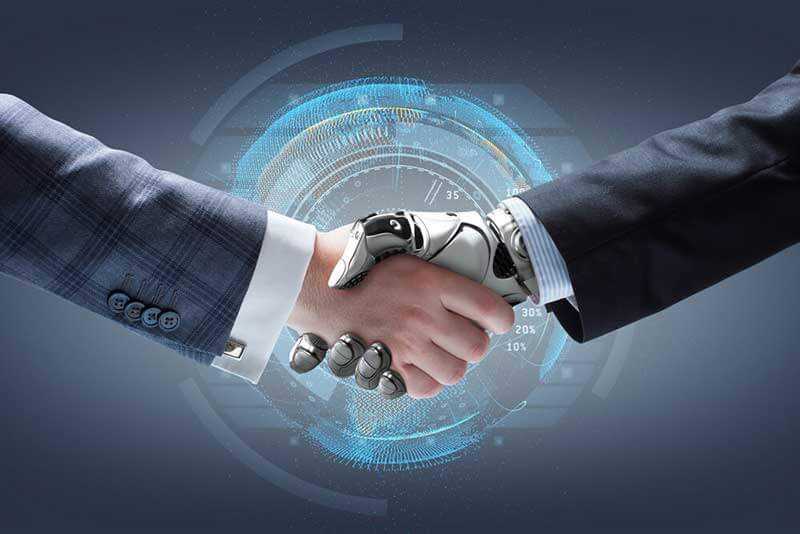- Robots will keep us healthier and safer and open up new worlds to explore
- With more sophisticated artificial intelligence trickling into our lives we will soon be socialising with machines
- Robots will offer us personalised medicine
- AI will revolutionise how we work but will it completely take over our jobs?
- Robots and machines will outsmart humans in the next 100 years
- Not only will we deal with robots more and more, we will actually become cyborgs ourselves
Artificial intelligence, or intelligence exhibited by software and machines, has the potential to impact our lives profoundly. This area of technology is being extensively pursued by the tech giants of the world such as Facebook and Google and never before has AI felt more omnipresent than now. It appears as though not a day goes by without new developments and cases where AI outperforms humans. What will the future of artificial intelligence bring to humanity? It could help us make our wildest dreams a reality or it could turn into a nightmare and destroy our world as we know it. Without a doubt, when machine intelligence reaches human intelligence levels, it will bring about a fundamental transformation in human civilisation and the world will never be the same again. This article is a collection of opinions and predictions by computer scientists, roboticists and researchers in artificial intelligence.
Free trendservice
Robots will keep us healthier and safer and open up new worlds to explore
Pieter Abbeel, computer scientist at Berkeley University in California says that artificial intelligence will enable us to deal with challenges such as looking after an ageing population and facilitating prolonged independence for elderly people. Artificial intelligence will make a significant reduction in traffic accidents and resultant injuries or death. It will also enable us to respond to disasters and dangerous situations resulting from natural disasters or accidents such as meltdowns at nuclear power plants. According to Sabine Hauert, roboticist at Bristol University, robotics will greatly improve the way we work, live and explore new worlds such as our oceans and even space. This will not happen overnight but incrementally. It will also happen in an integrated way. For instance, a self-driving car is actually a robot, but we will still see it as a car, not as artificial intelligence. Artificial intelligence will gradually be introduced to us in the form of useful technologies and smarter tech; not like robot armies suddenly invading our space.
With more sophisticated artificial intelligence trickling into our lives we will soon be socialising with machines
Carlos Guestrin, CEO of Seattle-based company Dato that builds AI algorithms to analyse data, says artificial intelligence may even turn out to become our best buddy. We can already see the roles our smartphones are starting to play in our everyday lives. It’s an almost symbiotic relationship between people and technology. The devices have helped us become more connected with others and assist us in keeping track of what’s happening around us. The technology augments our understanding of the world. It helps us to choose which movies to watch and which restaurants to visit. According to Hector Geffner, researcher at the Universitat Pompeu Fabra, one of the significant changes artificial intelligence will bring is the way we socialise. The movie “Her” is a good example. We are social beings and we need social interaction with people. In various societies however, people tend to feel more comfortable communicating with people via machines such as our computers or mobile phones, rather than dealing with humans directly. According to Matthew Taylor, computer scientist at Washington State University, more and more of our population is growing older and artificial intelligence could help them to stay in their own homes for longer. This will keep them happier and healthier, which is not only beneficial for them but also for the healthcare systems as a whole. We could have robots in their homes to help them with daily tasks such as food preparation, taking their medication on time and alerting relatives or caregivers when something is wrong. This technology is easy to develop in a short space of time and it will mean a huge change and improved quality of life.
Robots will offer us personalised medicine
According to computer scientist at Imperial College, Murray Shanahan, personalised medicine is a significant application of artificial intelligent technology and it will arrive soon. With everybody’s genomes sequenced and very finely detailed medical records uploaded to, for instance IBM Watson, healthcare providers have access to a vast amount of information. Thanks to machine learning, individual medical problems can be linked up with highly specialised medical treatments, specifically tailored to a particular patient. At the present moment, medical treatment is quite statistical and mainly tailored to large groups of people. Artificial intelligence will change this dramatically.
AI will revolutionise how we work but will it completely take over our jobs?
According to Toby Walsh, professor in AI at the National Information and Communications Technology in Australia, we will see profound changes in the way we work and how we perceive the concept of work. It is almost impossible to think of a job that a robot ultimately wouldn’t be able to do equally efficiently, or even more efficiently than a human. Imagine the changes this will cause in our societies. Vast savings will be generated by this type of automation and we will be working less hours. How will the wealth generated by automation be distributed? Will we see unconditional basic incomes soon? Bart Selman, computer scientist at Cornell University says that currently, most of our society is focused on getting an education to stay ahead of the changes but with the exponential technological developments this may actually prove rather complicated. When our self-driving cars suddenly become cheaper than the human driver, our entire system will be flipped upside down. When medical ‘professionals’ based on artificial intelligence become cheaper than human doctors, why shouldn’t we all switch to smart computers? These are some of the implications of implementing artificial intelligence. It disrupts society and we will have to adapt to these changes one way or another.
Robots and machines will outsmart humans in the next 100 years
Artificial intelligence expert Nick Bostrom recently confirmed what Stephen Hawking has already said a while ago: within the next century, robots and machines will have overtaken humans in terms of intelligence. When this happens, we better have the robots’ goals aligned with our own. Bostrom works at Oxford University where he leads the Future of Humanity Institute. He is known for his work in human enhancement ethics, super-intelligence and existential risks. According to Bostrom, if we do create super-intelligent machines, they will definitely shape our future, for the better or for the worse.
Not only will we deal with robots more and more, we will actually become cyborgs ourselves
Associate professor at the Informatics Institute at the University of Amsterdam, Shimon Whiteson says that people are generally of the opinion that there’s them – the computers – and then there’s us – humans. We think that computers will either be our friends or our enemies, and that we will be separate from them. But Whiteson thinks that we will all be cyborgs in the future; a tightly-coupled, cognitive unit. If we could augment our brains with infallible calculators and infallible memories, we would be so much more productive. In the future, the internet will be in our brain. Imagine the implications of that. The taxman will be able to see into our minds, skills could be downloaded or uploaded, and our brains could be hacked by criminals. This brings up a host of difficult to answer questions around privacy and security. Also, what will happen if this type of artificial intelligence is only available to the wealthy and only they can become cyborgs? How will that impact on society? Thomas Dietterich, President of the Association for the Advancement of Artificial Intelligence, is fascinated by the idea of human intelligence combined with artificial intelligence. He says this combination has the potential to create hyper-intelligent systems that can work with augmented reality and give us hearing, vision and sensing abilities that far exceed what we are currently able to achieve.
Share via:



